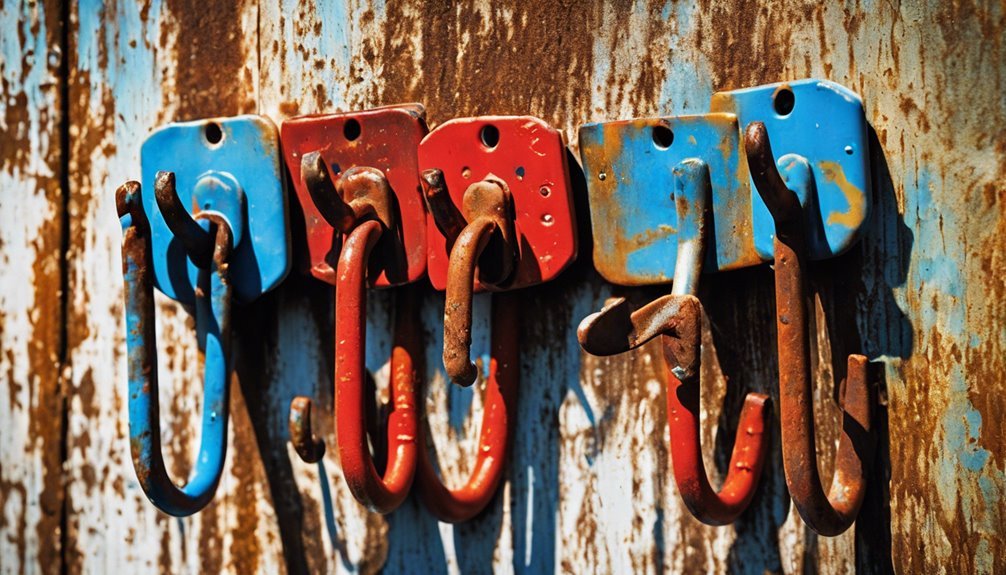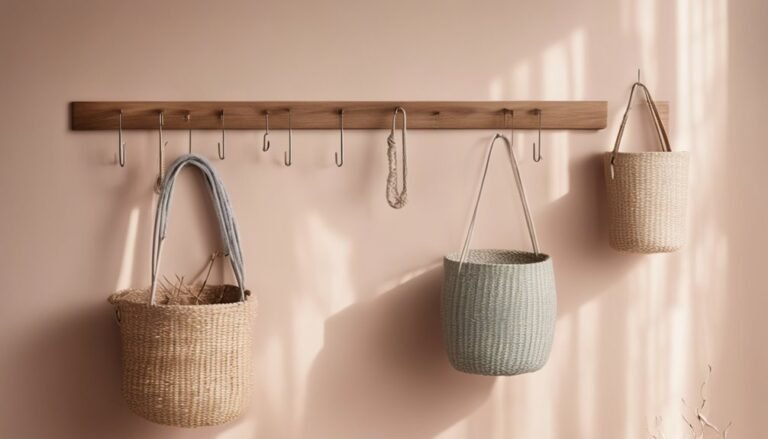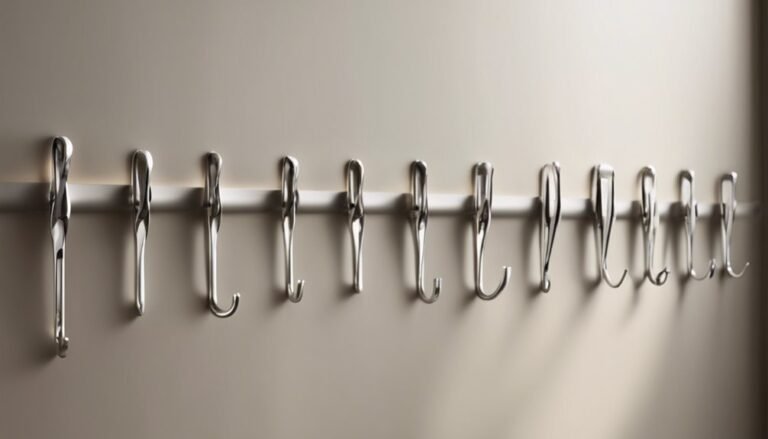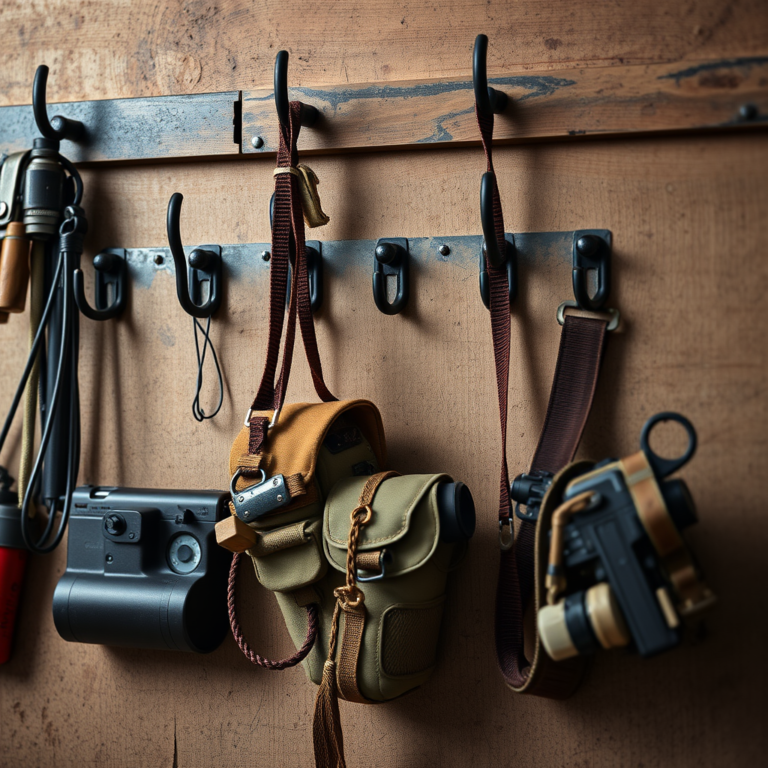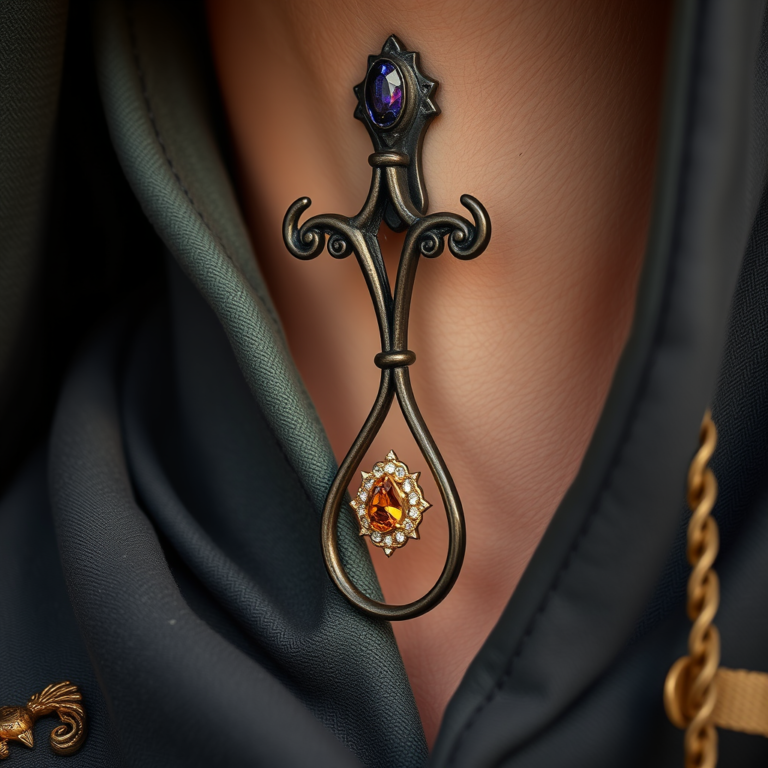Plastic Hooks vs. Metal Hooks
When comparing plastic hooks and metal hooks, consider their strengths and applications. Plastic hooks are lightweight, corrosion-resistant, and ideal for indoor use, especially in crafting. However, they may not support heavy loads. Metal hooks offer durability, better weight capacity, and rust resistance, making them suitable for outdoor applications. Each type has aesthetic and cost implications that may align with your project needs. To make an informed choice, explore the specific pros and cons of each type further.
Overview of Plastic Hooks
While you might think of hooks as simple tools, plastic hooks offer a range of features that make them both versatile and practical. There are various plastic hook types, including adhesive, suction, and snap-together designs, each catering to specific needs. For instance, adhesive hooks are ideal for temporary applications, allowing easy repositioning without damaging surfaces. Suction hooks work well in wet environments, like bathrooms, while snap-together hooks provide secure assembly for heavier items. The applications of plastic hooks span from home organization to crafting and outdoor activities. By understanding these different plastic hook types and their applications, you can maximize their utility, enhancing your ability to organize and secure items effectively, all while enjoying the freedom to adapt them to your unique needs.
Overview of Metal Hooks
Metal hooks are robust hardware solutions known for their durability and strength. You’ll find various metal hook types, including S-hooks, J-hooks, and heavy-duty eye hooks, each tailored for specific tasks. These hooks excel in applications ranging from securing loads in transportation to hanging tools in workshops. Their design allows for efficient weight distribution, making them ideal for both industrial and home use. While metal hooks often come with a higher initial cost compared to plastic, their longevity can lead to cost-effective solutions over time. Whether you’re looking to organize your garage or support heavy equipment, understanding the right metal hook types and their applications can greatly enhance your project’s success. Choose wisely, and you’ll appreciate their reliability.
Strength and Durability Comparison
When evaluating plastic and metal hooks, gauging their weight capacity is vital to determine which is more suitable for your needs. Additionally, understanding the lifespan and wear resistance of each material will help you make an informed choice about durability. These factors directly impact performance and longevity, making them essential points of comparison.
Weight Capacity Assessment
Evaluating weight capacity is essential when choosing between plastic and metal hooks, as each material exhibits distinct strengths and weaknesses. Understanding the implications of weight distribution techniques and load testing methods can guide your decision.
- Plastic hooks can bend under heavy loads.
- Metal hooks tend to support more weight.
- Weight limits can vary considerably between brands.
- Improper use may lead to failure in either type.
- Choosing the right hook impacts your safety and efficiency.
You’ll need to analyze these factors carefully to guarantee you’re making the right choice. Consider the specific applications you have in mind, as well as the potential risks involved. Ultimately, selecting the correct hook can grant you the freedom to hang items securely and confidently.
Lifespan and Wear Resistance
The longevity and resistance to wear of hooks play a significant role in their overall performance and reliability. When comparing plastic and metal hooks, consider their lifetime performance under varying conditions. Plastic hooks can offer decent wear resistance, but they tend to degrade more rapidly when exposed to harsh environments, UV light, or heavy loads. Metal hooks, on the other hand, exhibit superior durability, often resisting wear and tear much longer, especially in demanding applications. While they may be heavier and costlier, their enhanced lifespan makes them a worthwhile investment for those seeking reliability. Ultimately, your choice should balance initial costs with the anticipated lifetime performance, ensuring you select the hook that best meets your durability needs.
Weight Considerations
Although both plastic and metal hooks serve similar functions, their weight can considerably impact your choice depending on the specific application. Evaluating the hook weight is vital as it directly influences hook performance.
Consider these factors when deciding:
- Ease of handling: Lighter hooks can make your tasks less cumbersome.
- Load capacity: Heavier metal hooks often support more weight.
- Durability: Weight may correlate with material strength.
- Transportability: Light hooks are easier to carry on-the-go.
- Versatility: Different weights can accommodate various applications effectively.
Ultimately, the right hook weight can lead to enhanced performance, making your experience smoother and more efficient. Choose wisely to guarantee you achieve the freedom you desire in your projects.
Rust and Corrosion Resistance
When you consider rust and corrosion resistance, the material composition of plastic and metal hooks plays an essential role. Environmental factors, such as humidity and exposure to chemicals, can greatly affect the longevity of each type. Understanding how these elements interact will help you make a more informed choice for your specific needs.
Material Composition Differences
Plastic hooks and metal hooks exhibit distinct differences in their resistance to rust and corrosion, greatly affecting their durability and longevity. When considering material properties, plastic hooks are inherently resistant to moisture, while metal hooks, depending on their alloy, may corrode over time. This stems from their respective manufacturing processes, which dictate how they interact with environmental elements.
- They’re lightweight and easy to handle.
- You won’t worry about rust stains.
- They can last longer in humid conditions.
- You’ll spend less time replacing them.
- Freedom from constant maintenance!
In choosing between the two, it’s essential to weigh these factors, as they directly influence your hook’s performance and your overall satisfaction.
Environmental Impact Factors
Choosing between plastic and metal hooks involves considering their environmental impact, particularly regarding rust and corrosion resistance. Metal hooks, while durable, can rust over time, especially in humid environments, leading to increased waste and environmental concerns. This corrosion not only reduces the lifespan of the hooks but also necessitates disposal and replacement, impacting sustainability practices. On the other hand, plastic hooks resist corrosion but can contribute to plastic pollution if not properly disposed of. However, many plastics now have recycling options that can mitigate their environmental burden. When evaluating your choice, weigh the long-term implications of rust and corrosion against the potential for recycling, ensuring your decision aligns with your values of sustainability and environmental responsibility.
Maintenance and Longevity
While evaluating maintenance and longevity, it’s essential to reflect on how rust and corrosion resistance influence the lifespan of hooks. Metal hooks, while durable, often succumb to rust, necessitating careful maintenance. In contrast, plastic hooks offer a longer life without the worry of corrosion. Here are some maintenance tips and longevity strategies to bear in mind:
- Regularly inspect for signs of wear.
- Store hooks in a dry environment.
- Clean hooks after exposure to moisture.
- Use protective coatings on metal hooks.
- Replace damaged hooks promptly.
Aesthetic Appeal and Design Options
When considering aesthetic appeal and design options, the contrast between plastic and metal hooks becomes apparent in their versatility and visual impact. Plastic hooks often feature vibrant color variations and align with contemporary design trends, making them suitable for casual or playful spaces. In contrast, metal hooks provide a sleek, minimalist look that complements modern and industrial decor.
| Material | Color Variations | Design Trends |
|---|---|---|
| Plastic | Bright, diverse hues | Trendy, playful |
| Metal | Limited (usually metallic) | Classic, minimalist |
| Both | Customizable options | Versatile, adaptable |
Ultimately, your choice will reflect your personal style and the ambiance you wish to create in your space.
Cost Analysis
Aesthetic considerations often come with varying price points, making cost analysis a significant factor in selecting between plastic and metal hooks. When you evaluate your options, you’ll want to assess the price comparison and manufacturing costs associated with each type.
- Lower initial investment with plastic hooks
- Potentially higher durability with metal hooks
- Long-term replacement costs of plastic
- Environmental impact of manufacturing processes
- Overall value based on longevity and usage
Ultimately, understanding these financial aspects empowers you to make an informed choice. Weigh the benefits of each hook type against your budget, ensuring that you select the option that aligns with your needs and values while maintaining your freedom of choice.
Best Use Cases for Each Type
Choosing the right hook type depends largely on its intended application, as each material serves distinct purposes effectively. For crafting projects, plastic hooks are often ideal due to their lightweight nature and versatility. They won’t rust or corrode, making them perfect for indoor decor or temporary installations. Conversely, if you’re tackling outdoor applications, metal hooks are the better choice. Their durability and strength can withstand varying weather conditions, ensuring your installations remain secure over time. Additionally, metal hooks can support heavier loads, making them suitable for outdoor gear or equipment. Ultimately, aligning your hook choice with your project’s requirements will enhance performance and longevity, allowing you to enjoy your creations without worry.
References
- https://en.wikipedia.org/wiki/Plastic
- https://www.ncbi.nlm.nih.gov/pmc/articles/PMC4992949/
- https://www.sciencedirect.com/science/article/pii/S0141391014001879
- https://www.americanchemistry.com/chemistry-in-america/what-is-plastic/
- https://www.epa.gov/recycle/recycling-plastics
- https://www.plastics.americanchemistry.com/
- https://www.nationalgeographic.com/environment/article/plastic-pollution
- https://www.cdc.gov/nceh/lead/faq/plastics.htm

